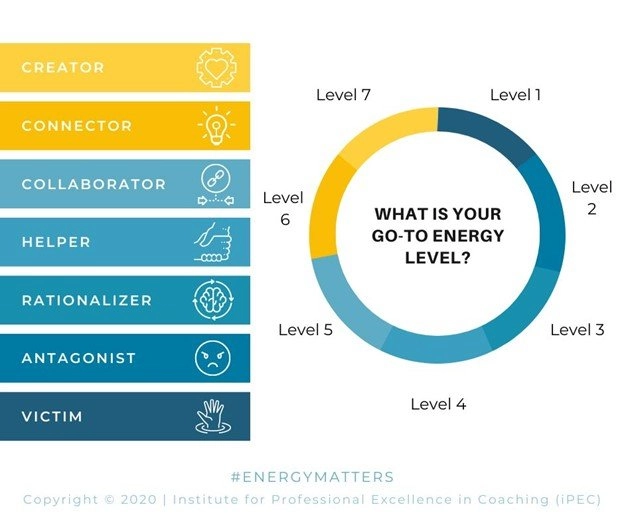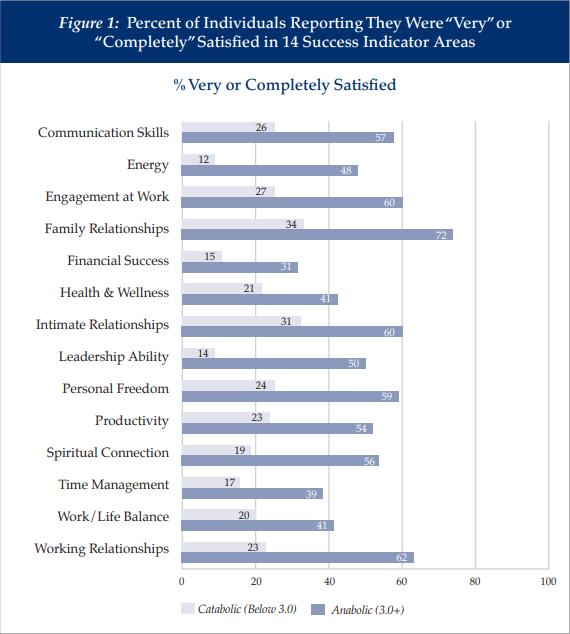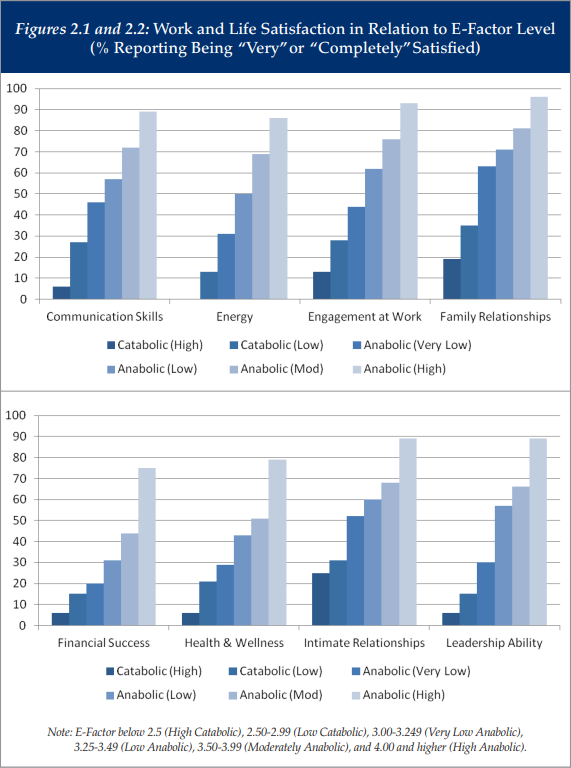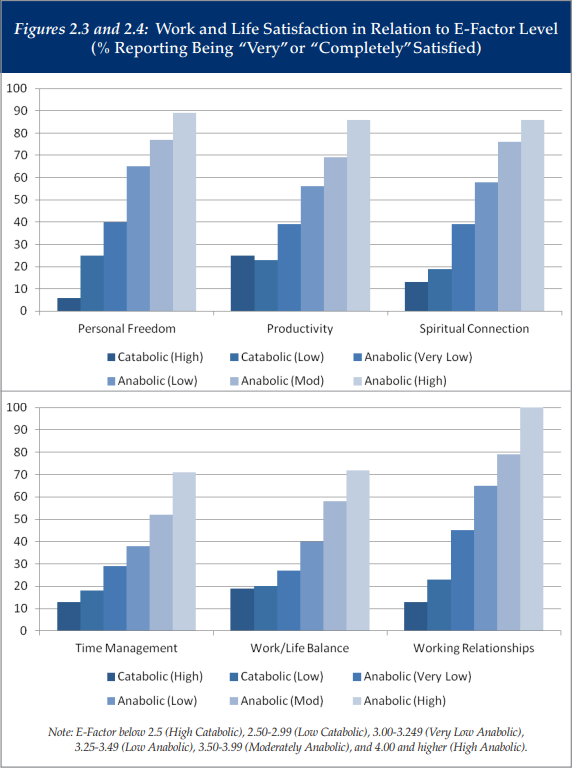If someone asked you whether “more life satisfaction” was something you wanted, odds are you’d blurt out, “yes, please!” without hesitation—and yet, it’s one of those things that most people might (understandably!) struggle to measure.
What if we told you there was a measurable way to feel more satisfied in your work and life—and to create a company culture that helps staff at every level of an organization do the same?
Good news! iPEC teamed up with Zajonc Corporation, a leading expert in statistical research and evaluative analysis, to prepare a study that shows that people with higher levels of energy are actually more satisfied in their work and lives. 🙌
In this article, we’ll dive into the details of the study, break down the findings, and discuss how companies can use this information to re-evaluate their corporate culture and their approach to job satisfaction.
AN OVERVIEW OF HOW THE LIFE SATISFACTION STUDY WAS CONDUCTED
The study consisted of a sample size of 1,361 non-coach participants and is based on 14 key areas of life (see Figure 1 below) including leadership ability, productivity, work/life balance, communication skills, and time management.
Participants in the study all took the Energy Leadership Index (ELI) assessment, an online assessment that measures how an individual perceives and approaches work and life. The result of the assessment produces their Average Resonating Level of Energy or “E-Factor” for short.
An Average Resonating Level of Energy is a combined numerical value of a person’s mental, emotional, spiritual, and physical energy that helps to indicate the person’s overall satisfaction in work and life. This indicator of satisfaction is derived from the Energetic Self Perception Chart, which delineates seven levels of consciousness or awareness of self and life.

To better illustrate the stark contrast of responses, participants were first divided into two primary groups:
- Catabolic: Those in the Catabolic range (i.e., an E-Factor value of less than 3.0) consisted of the first two energy levels (‘antagonistic’ and ‘victim’) which are generally viewed as being destructive, draining, de-motivating, or contracting ways of being.
- Anabolic: Those in the Anabolic range, (i.e., an E-Factor of 3.0 or higher) consist of the five highest energy levels (rationalizer, helper, collaborator, connector, and creator) which are predominantly seen as constructive, rejuvenating, self-motivating, or expanding ways of being.
From there, the sample was further stratified into six subgroups based on each participant’s Average Resonating Level of Energy:
- High Catabolic: E-Factor below 2.50
- Low Catabolic: E-Factor between 2.50 and 2.99
- Very Low Anabolic: E-Factor between 3.00 and 3.249
- Low Anabolic: E-Factor between 3.25 and 3.49
- Moderately Anabolic: E-Factor between 3.50 and 3.99
- High Anabolic: E-Factor of 4.00 and higher
WHAT THE LIFE SATISFACTION STUDY REVEALED
The study very clearly shows that the higher a person’s Average Resonating Level of Energy, the greater the overall level of life and work satisfaction. Those respondents whose E-Factor was 3.37 or higher were shown to be significantly more likely to report at least moderate overall satisfaction. It wasn’t until E-Factors reached 3.64 or higher that respondents were more likely to report being very or completely satisfied overall.

Out of the sample of 1,361 participants, those who had a natural disposition toward living at the cause of life (High Anabolic Energy), were 100% satisfied with their working relationships, 93% satisfied with their level of engagement at work, and nearly 90% satisfied with their level of leadership and inherent communication.

Their counterparts, those living at the effect of life (High Catabolic Energy), reported only 13% satisfaction regarding their engagement level in their career. When it came to communications skills, financial success, and leadership ability, they reported only a 6% satisfaction rate across the board.

This contrast points toward a crucial gap and more specifically, to the impact of how an individual “shows up” in the world. Namely, the amount of energy and passion with which they need to fuel their relationships and professional career.
To view the full results, you can read the complete Energy Leadership Index study.
WHAT DO THESE RESULTS MEAN FOR BUSINESSES AND THEIR APPROACH TO CORPORATE CULTURE?
These findings have served as a catalyst for companies to re-evaluate their corporate culture in favor of leadership and employee engagement, higher productivity levels, and an “inside out” approach to job fulfillment. This comes at a time when U.S. businesses, on average, are losing around $1 TRILLION each year as a direct result of employee turnover, according to recent Bureau of Labor statistics.
We spoke with Renee West, President and Chief Operating Officer of the Luxor and Excalibur, two Las Vegas-based hotel/casinos owned by MGM Resorts, one of the world’s leading global hospitality companies. She admitted they struggled for years to find the “secret sauce” to counteract catabolic energy while promoting a sustainable foundation for employee engagement. It wasn’t until the hospitality chain was introduced to Energy Leadership™ and the Core Energy Coaching™ process that its culture underwent a remarkable change.
According to West, 35 company executives were trained through iPEC’s corporate engagement program. This gave them the ability to “coach their mid-level managers rather than direct them, resulting in a shift in how those managers lead frontline employees, in addition to having a definitive impact on customer satisfaction.”
West represents one of the many companies making this integrative approach to training a “must-have” investment that’s sizeable and long-term, rather than feeding into a catabolic status quo, which often leads to employee attrition and burnout.
“Engagement stems from core energy, as measured by one’s E-Factor, and in order to make effective changes to workforce engagement, core energy must be shifted from catabolic to anabolic,” explains Luke Iorio, an iPEC Board Member. “Our Core Energy Coaching™ Process, guided by the framework of Energy Leadership™, is designed to shift energy levels so that an authentic playing field emerges, productivity soars, and employee disengagement becomes obsolete.”
INVEST IN YOUR EMPLOYEES AND YOUR BUSINESS TODAY
iPEC offers highly successful and powerful coach-centric leadership engagement training to corporations, organizations, governments, law enforcement agencies, and non-profit organizations around the world. iPEC has earned recognition by Leadership Excellence Magazine as one of the Top Leadership Development Programs.
Want a taste? Imagine having the tools and skills you need as a leader to help your team consistently exceed the goals you’ve set for them! Download How to Lead a Team—our definitive guide to enhancing team performance through coach-centric leadership—and take your first step toward becoming a new kind of leader and change-maker.
About Zajonc Corporation
Zajonc Corporation is a nationwide evaluation company that was established in 2000. Zajonc provides a comprehensive array of program evaluation services to include evaluation design, logic model development, basic-to-complex statistical analysis, and psychometric services. Zajonc works with for-profit and nonprofit organizations, cities, counties, schools, and universities from New York to California.

